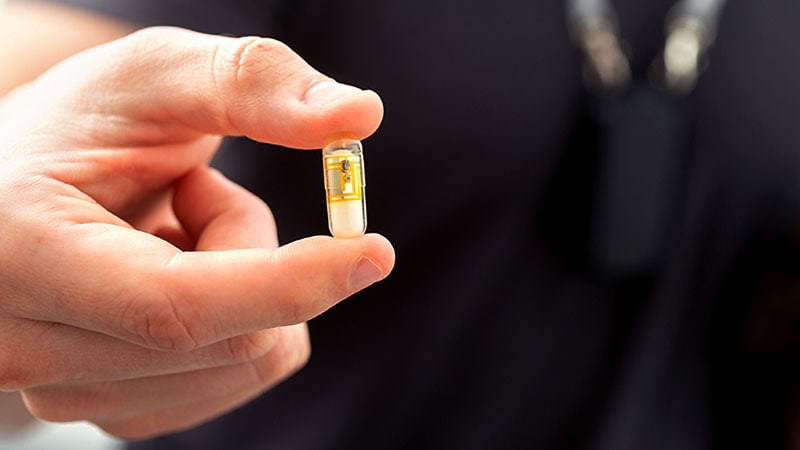The Revolutionary Impact of Smart Pills on Healthcare
Conceitos Básicos
Smart pills are revolutionizing healthcare by enabling real-time monitoring and personalized interventions.
Resumo
Introduction
- James Messenger participates in a study testing a new "smart pill" to detect overdoses.
- The Vitals Monitoring capsule is part of a growing trend redefining pill capabilities.
Historical Milestones
- Heidelberg capsule in 1965 measured gut acidity.
- 1994 saw the introduction of the term "smart pill" by the University of Buffalo.
- FDA approved the first video capsule endoscope in 2001.
Slow Adoption of Smart Pills
- Challenges in cost, technology, and clinician/patient acceptance hindered smart pill revolution.
- Over 300 iterations in development aim to address various health issues.
Vitals Monitoring Capsule
- Celero Systems' capsule can measure heart rate and breathing from within the gut.
- Potential to detect respiratory distress and administer overdose-reversal drugs.
Medication Adherence
- ID-Cap smart pill by etectRx improves adherence to HIV/AIDS prevention regimen.
- Previous designs like Abilify MyCite faced challenges but newer versions are more streamlined.
Pillcams Evolution
- Pillcams offer non-invasive imaging but have limitations in intervention and coverage.
- Advances in locomotion and AI could enhance pillcam capabilities.
Future Prospects
- Researchers are developing smart pills with AI models and vibrating weight loss capsules.
- Concerns about privacy and technology reliance are raised.
Conclusion
- Smart pills have not yet mainstreamed but show promise in revolutionizing healthcare.
Personalizar Resumo
Reescrever com IA
Gerar Citações
Traduzir Texto Original
Para Outro Idioma
Gerar Mapa Mental
do conteúdo original
Visitar Fonte
www.medscape.com
The Next Gen of Smart Pills Will Transform Personalized Care
Estatísticas
Nearly 300 smart pill iterations are in development.
Celero's vitals monitoring pill can detect respiratory rate with 93% accuracy.
ID-Cap smart pill improved adherence to HIV/AIDS prevention regimen by double digits.
New magnetically controlled capsule endoscopy accurately identified stomach landmarks 95% of the time.
Citações
"It could be a great way to keep people alive long enough for them to get their head wrapped around the idea of treatment." - James Messenger
"If we can come up with a Mars rover which can explore other planets, we should be able to have something that can explore the stomach remotely." - Andrew Meltzer
"But overall, it would be fair to state that this technology has come of age and the future is bright." - Vivek Kaul
Principais Insights Extraídos De
by Lisa Marshal... às www.medscape.com 03-14-2024
https://www.medscape.com/viewarticle/next-gen-smart-pills-will-transform-personalized-care-2024a10004tm
Perguntas Mais Profundas
How can smart pills impact healthcare beyond monitoring and intervention?
Smart pills have the potential to revolutionize healthcare in various ways beyond monitoring and intervention. They can significantly improve medication adherence, especially for chronic conditions like HIV/AIDS, where consistent medication intake is crucial. By using smart pills like the ID-Cap, healthcare providers can ensure that patients take their medications as prescribed, leading to better treatment outcomes and potentially reducing the spread of diseases. Additionally, smart pills can enhance diagnostic procedures by providing non-invasive imaging of internal organs, such as the small intestine, without the need for traditional invasive procedures like endoscopy. This can lead to earlier detection of diseases and more personalized treatment plans for patients.
What are the potential risks associated with the widespread adoption of smart pills?
While smart pills offer numerous benefits, their widespread adoption also comes with potential risks. One major concern is privacy and data security. Smart pills collect sensitive health data, and there is a risk of this information being compromised or misused. Patients may be hesitant to use smart pills if they feel their privacy is not adequately protected. Another risk is the overreliance on technology in healthcare. If healthcare providers rely too heavily on smart pills for diagnosis and treatment, there is a risk of dehumanizing patient care and overlooking the importance of the human touch in medicine. Additionally, there may be concerns about the cost of smart pills and whether they will be accessible to all patients, regardless of their financial situation.
How can advancements in smart pill technology influence other industries or fields?
Advancements in smart pill technology have the potential to influence various industries and fields beyond healthcare. For example, the development of location-aware smart pills using magnetic fields could have applications in the food industry for monitoring food in the gastrointestinal tract. This technology could be used to track the movement of food through the digestive system, providing valuable insights for nutritionists and dietitians. In the field of robotics, the concept of self-driving smart pills could inspire innovations in autonomous vehicles and drones, where AI could be used to navigate and make decisions in real-time. Furthermore, the use of AI models to enhance image transmission from inside the body could have implications for virtual reality and augmented reality technologies, improving the visualization of complex data in various industries.
0
